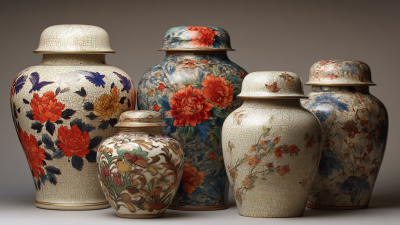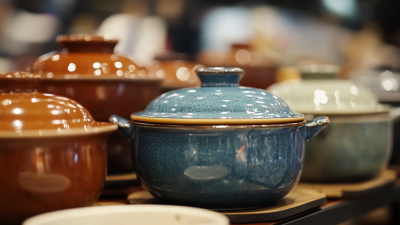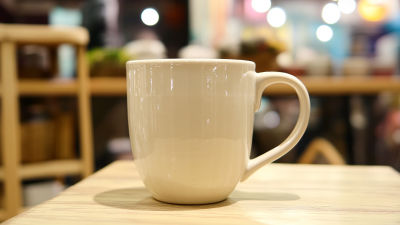

The growing awareness of environmental impact has led to a significant shift in how we approach memorialization, particularly when it comes to the choice of urns. Traditionally, porcelain urns have been a popular choice due to their aesthetic appeal and durability, yet they come with a substantial carbon footprint associated with their production and transportation. According to the National Funeral Directors Association, nearly 55% of Americans are now interested in eco-friendly alternatives, reflecting a broader trend towards sustainability in end-of-life practices. In light of this, we delve into innovative, eco-conscious options that not only honor the memory of loved ones but also minimize environmental impact. This exploration highlights top strategies for selecting sustainable memorialization choices that resonate with both personal values and global responsibility.

 Choosing eco-friendly urns for memorialization offers numerous benefits that align with a growing commitment to sustainability. Traditional porcelain urns, while beautiful, often do not account for the environmental impact of their production and disposal. In contrast, eco-friendly alternatives, such as biodegradable urns made from natural materials like bamboo, recycled paper, or even salt, provide a thoughtful and responsible option for honoring loved ones. These urns not only minimize ecological footprints but also allow families to contribute positively to the environment.
Choosing eco-friendly urns for memorialization offers numerous benefits that align with a growing commitment to sustainability. Traditional porcelain urns, while beautiful, often do not account for the environmental impact of their production and disposal. In contrast, eco-friendly alternatives, such as biodegradable urns made from natural materials like bamboo, recycled paper, or even salt, provide a thoughtful and responsible option for honoring loved ones. These urns not only minimize ecological footprints but also allow families to contribute positively to the environment.
One significant advantage of selecting sustainable urns is their potential to promote life after death. Many biodegradable urns are designed to break down naturally, returning nutrients to the soil and nurturing new life in the process. This aligns with many modern philosophies that celebrate the cycle of life, turning a time of loss into an opportunity for renewal. Additionally, eco-friendly urns often come with unique designs that reflect the spirit of the departed, allowing for a personal touch that enhances the memorial experience. By choosing these alternatives, families can ensure that their memorialization practices are as meaningful as they are environmentally conscious.
As we seek to honor our loved ones in ways that align with our values, eco-friendly alternatives to traditional porcelain urns are gaining popularity. Natural materials like bamboo, wood, and biodegradable options not only serve as sustainable choices but also contribute to a more compassionate farewell.
Bamboo urns are a beautiful option, known for their rapid growth and renewability. They can be intricately designed, showcasing the natural patterns and hues of the bamboo. When opting for a bamboo urn, consider its source—choose ones crafted from sustainably harvested bamboo to ensure minimal environmental impact.
Wooden urns, made from reclaimed or responsibly sourced timber, offer a timeless elegance. They encapsulate the warmth and connection to nature while providing a unique memorial. If you lean toward wooden options, look for artisans who use local woods and eco-friendly finishes to further reduce your carbon footprint. Additionally, consider biodegradable urns made from materials like paper or plant fibers, which enrich the earth rather than contributing to landfill waste.
Tip: When selecting an urn, think about how it aligns with your values of sustainability and what materials resonate with the life and spirit of your loved one.
As the world becomes increasingly conscious of environmental sustainability, the need for eco-friendly memorialization options has never been more crucial. The shift from traditional porcelain urns to innovative urn alternatives reflects a transformative approach to honoring loved ones while minimizing ecological impact. Companies are now exploring materials such as biodegradable substances, recycled composites, and sustainably sourced wood, creating designs that not only serve the purpose of memorialization but also embrace responsible consumption.
One exciting trend in sustainable urn design is the incorporation of natural elements that promote environmental integration. For instance, some urns are designed to break down over time, returning nutrients to the earth and contributing to the growth of trees or flowers. These living memorials serve as a beautiful tribute, allowing families to celebrate the life of their loved ones while fostering a connection to nature. Additionally, contemporary artisans are infusing their creations with artistic flair, blending functionality with aesthetic appeal to craft unique and meaningful memorial pieces that resonate with individual stories and values.
| Material | Sustainability Rating | Durability | Design Options | Price Range |
|---|---|---|---|---|
| Bamboo | High | Moderate | Natural, Engraved | $100 - $300 |
| Recycled Paper | Very High | Low | Custom Shapes, Prints | $50 - $150 |
| Ceramic (Eco-Friendly) | Moderate | High | Classic, Modern | $200 - $500 |
| Salt Crystal | High | Moderate | Translucent, Unique | $150 - $400 |
| Biodegradable Composite | Very High | High | Stylish, Minimalist | $120 - $350 |
Cultural practices surrounding memorialization play a significant role in how we honor our loved ones. Across various traditions, the integration of eco-conscious practices has emerged as a response to the growing concerns surrounding environmental sustainability. According to a report by the Cremation Association of North America, over 56% of Americans now prefer cremation, and many of these individuals are seeking eco-friendly alternatives to traditional porcelain urns. This shift highlights a collective awareness of the environmental impact of conventional memorialization methods.
In cultures such as Buddhism and Hinduism, natural options like biodegradable urns made from materials such as salt, paper, or even plant-based substances are becoming increasingly popular. Research from the Green Burial Council indicates that alternative burial methods not only lessen the carbon footprint but also promote a sense of returning to nature, aligning with spiritual beliefs. Similarly, in Indigenous practices, the focus on sustainability and respect for nature is deeply embedded, as evidenced by the use of natural materials that decompose naturally, allowing the body to nourish the earth. By embracing these eco-friendly alternatives, we not only honor our loved ones but also contribute to a more sustainable future.
This chart illustrates the popularity of different eco-friendly alternatives to porcelain urns for memorialization. The data represents the percentage of individuals choosing each option based on a survey conducted in 2023.
As the demand for eco-friendly memorialization grows, many are embracing the concept of personalized eco-friendly urns, which offer a sustainable and meaningful way to honor loved ones. These urns can be crafted from biodegradable materials and designed to reflect the individuality of the deceased. For instance, families can choose plantable urns that not only serve as a vessel for ashes but also grow into a tree or plant, symbolizing the cycle of life. This approach transforms the memorial into a living tribute, allowing the memory of the individual to thrive in nature.
Personalization can extend beyond just the choice of material. Families can incorporate significant symbols or engravings that resonate with the lives of their loved ones. Custom designs inspired by hobbies, favorite colors, or meaningful quotes add an extra layer of emotional connection. Additionally, many artisans now offer the option of creating urns that echo personal narratives or cultural backgrounds, making the memorialization process deeply personal and unique while remaining environmentally conscious. This shift towards sustainable practices in memorialization reflects a broader societal move towards recognizing our impact on the planet, making eco-friendly urns a profound choice for generations to come.







